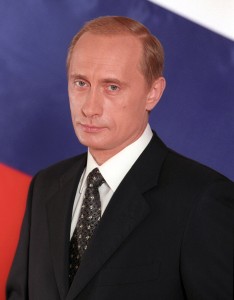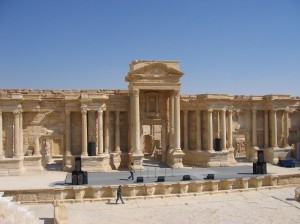First, the ostensible reason for this incident is the Turkmen rebels in Syria. Erdogan summoned the Russian ambassador earlier this week to warn against strikes against the Turkmen in Syria.
Second, it’s worth considering that much of this is about Turkish domestic politics. Erdogan is playing to the crowd, in the same way done by jingoistic politicians all over the world.
Then there is Putin’s statement:
This event is beyond the normal framework of fighting against terrorism. Of course our military is doing heroic work against terrorism… But the loss today is a stab in the back, carried out by the accomplices of terrorists. I can’t describe it in any other way. Our aircraft was downed over the territory of Syria, using air-to-air missile from a Turkish F-16. It fell on the Syrian territory 4km from Turkey.
…
We will analyse everything, and today’s tragic event will have significant consequences, including for Russia-Turkish relations. We have always treated Turkey as a friendly state. I don’t know who was interested in what happened today, certainly not us. And instead of immediately getting in contact with us, as far as we know, the Turkish side immediately turned to their partners from Nato to discuss this incident, as if we shot down their plane and not they ours.
So, Putin is saying that Turkey is the “accomplice of terrorists.” Because the preponderance of evidence is that Turkey has been keeping supply lines open for ISIS, I would tend to agree. But something being true, and something being stated by the leader of a Great Power are two different things. Putin calling Erdogan an accomplice of terrorists is a big deal.
Russia can retaliate in a number of ways, from the obvious (shooting down a Turkish jet in a “tit-for-tat”), to the brutal (cutting Turkey off from natural gas this winter) to the subtle (taking the Turkish PKK under wing and becoming their new sponsors, while providing the Turks in general with equipment such as man portable anti-air missiles and anti-tank weapons).
Bear in mind that the Turkish military is very large, with a pile of tanks. They have, however, spent their recent history mostly in anti-insurgency efforts (burning Turkish villages, rape and torture, the usual), and anti-insurgency tends to degrade militaries. It is also an open question how much the purges of the officer corps have affected the military.
NATO and President Obama have both made supportive sounds, so Russia and Putin are likely to lump in the West with Turkey in this matter.
I feel I should point out the obvious, once more. Russia is still a nuclear armed state with enough nuclear weapons to destroy the world multiple times over. A confrontation between NATO and Russia is not acceptable to anyone even remotely sane.
Finally, there is the question of whether or not the Russian jet was in Turkish airspace. The Turks claim it was (for a few seconds), the Russians claim it wasn’t. I certainly don’t know which is true.
But over-fussiness about a few seconds strikes me as absurd. The US routinely violates virtually every country in the world’s airspace. Turkey and everyone else in the region routinely violates Syrian airspace, while Russia actually has permission to be there.
I believe that countries should not violate each other’s airspace. And I would be willing to support that principle in a world where that was the practice, but it is not.
That said, the real rule of airspace is: “Can you shoot me down?” And Syria’s answer is: “No.” But Russia’s answer Russia is: “Yes,” and Russia could decide to defend Syria’s airspace from Turkey at the request of the Syrian government.
All of this is vastly complicated by geography. Turkey can close off the Black Sea from the Mediterranean any time it wants. This means that Russia’s supplies to Syria must go through either Iran and Iraq, or it must come the long way around from the Baltic Sea.
By and large, however, this entire exercise stinks of hypocrisy. The fact is that despite all the screaming and the rhetoric almost no one actually wants to defeat ISIS. Turkey definitely doesn’t want to, the US doesn’t want to because its allies like Saudi Arabia, the Gulf States and Israel in varying degrees support ISIS, and the West in general doesn’t want to (as with France bombing empty depots in response to the Paris attacks; sound and fury accomplishing nothing.)
Russia wants to support the Syrian government, and the first thing Russia wants to do is seal the Turkish border in order to cut off ISIS’s main supply line and source of recruits.
That is what this is really about. Turkey wants what remains of the Syrian state to collapse or to become a puppet (thus “Assad Must Go”). The goals of the two states are in direct opposition. And Erdogan has just made it clear in how much direct opposition.
This particular incident is about ISIS only indirectly, but be clear: The only people who really want to defeat ISIS are Russia, Iran, Syria, Hezbollah, the Kurds, and Iraq. No one else of significance does.
Your deaths in Paris and elsewhere, children, whatever hypocrisy Western leaders like Hollande may spew, are acceptable collateral casualties to your masters. They will turn Europe into a police state in an attempt to root out ISIS cells (and because they wanted a police state already and this is a great excuse), but they are not actually serious about defeating ISIS.
(Addendum, Obama’s statement:
President Obama noted that it was important to ensure that Russia and Turkey continue to talk to each other, but went on to say: “This points to an ongoing problem with the Russian operation, in the sense that they are operating very close to the Turkish border and going after moderate opposition supported by Turkey and a wide range of countries.”
Anyone who says “moderation opposition” is either abysmally stupid or lying. (Again, no Western country is serious about defeating ISIS.))
(Addendum #2, Lieutenant General Sergei Rudskoy:
Now the General Staff is elaborating additional security measures for the Russian airbase.
First: All the activities of the attack aviation will be carried out only under cover of fighter aircraft.
Second: Air defence will be reinforced. For that purpose, the Moskva cruiser equipped with air defence system Fort analogous to the S-300 one will go to the shore zone of Latakia. Russian Defence Ministry warns that all the potentially dangerous targets will be destroyed.
Third: Contacts with Turkey will be terminated at the military level».)
Ouch. AKA, “Don’t try that again unless you want an actual fight.”)
If you enjoyed this article, and want me to write more, please DONATE or SUBSCRIBE.


